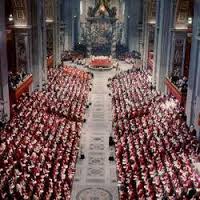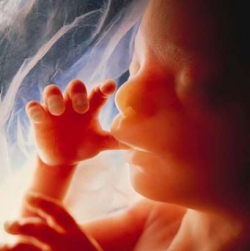“How,” I’ve often wondered, “was the Second Vatican Council so artfully reinvented, that the very bishops who attended the Council implemented changes in its name which they had never envisaged?”
Books have been written answering that question, and I don’t think the answer is settled even now. But there’s another question — a related question — which I think is being definitively answered at this very moment.
“If the Council were to occur today could it be manipulated and reinterpreted as it was in the 60s?”
I’ve suspected not. In the first place, the media is much more democratic these days. It was possible, at the time of the Council, to mould and control a media image. But the abundance of independent media voices — especially online — now makes that impossible. Just ask any government, anywhere. (North Korea excepted.)
In the second place, within the Church unquestioning obedience is a distant memory. At the time of the Council, if the local bishop made a decision, priests would faithfully communicate and execute that decision, and the vast majority of lay faithful complied. That doesn’t happen anymore. Not in the West, anyway.
The present Synod of Bishops, which has become something of a debacle, proves these points. I think there was an attempt to manipulate the synod, just as the Council was manipulated, but it hasn’t worked.
Proceedings of the present synod are closed to the media: an unprecedented innovation which enables the General Secretariat to control information flow. Synod Fathers are unable to publicise the speeches they table, but they’re free to speak to journalists outside session. So they have — and many have openly criticised the control of information.
Following convention, Synod Fathers elected representatives to draft the synod’s final report. In another unprecedented innovation — which as pope he is entitled to do — Francis appointed six of his own nominees to the task. But the official news bureau of the Portuguese Bishops’ Conference underlines the political significance of this intervention:
The fact is worrying those who want to maintain the current discipline of the Church regarding these issues, considering that all the persons named by the Pope are of a liberal tendency, unlike Erdö.
In yet another unprecedented innovation, the General Secretariat has published an interim report. And this is where the attempts at manipulation have really unravelled. The report is, to say the least, problematic — both in its content, and in the fact that it doesn’t represent the synod. Archbishop Gądecki, who heads the Polish Bishops’ Conference, has called it unacceptable. Cardinal Müller, who heads the Congregation for the Doctrine of the Faith, has called it “undignified and shameful.”
But the most damning evidence of attempted manipulation? During the press conference which followed the report’s release — a press conference which left at least one Catholic journalist unedified — Cardinal Erdö, who is charged with officially speaking for the Synod Fathers, handballed a controversial question to his assistant, effectively disowning a document bearing his signature:
The Hungarian cardinal […] gave the floor to Mgr. Forte because, he said, “he who wrote the text must know what it is talking about.”
I have only quoted the misgivings and criticisms of Synod Fathers. A cursory glance at the Catholic blogosphere will reveal even greater disquiet among disinterested observers. Much of the online commentary is overblown and hysterical because the Internet is a hot house of wild opinion and speculation. But even so, the online response demonstrates that resistance to the attempted manipulation is widespread and savvy — a phenomenon which wasn’t present 50 years ago. If the Internet had existed during the Second Vatican Council, I think the implementation of that Council would have been very different.






Thankyou for your insight into the Synod happenings Fr. John,
I have been quite worried about media interpretation of the Synod, and as to what internet source Catholic faithful may be reading from.
I’m curious, Father John. What ‘debacle’ are you referring to? The fact you don’t know quite who is saying what, or that it is not a uniform message to your preference? Don’t you think the Synodal disagreements are a reflection of the actual state of things in the wider Church community and world?
The truth is some people want things to be one way; and others want it to be another way: there are those who want people to pray, pay and obey (and shut up); others who still pray but won’t obey because they reject what they see as wrong or silly, and won’t pay as much because there are competing causes considered as or more worthy of their shrinking dollars, and won’t be shut up. Naturally, everyone will think God is on their side. (Poor God!)
In fact, what we are continuing to see, I think, is the slow, uneven, unpredictable evolution of the church and the increasing revision of a top-down model. I appreciate that you and your readers don’t like that, so, like the Tsars, you’ll have to work out a way to stop the evolution (or revolution) – but if history and blog-commentary rhetoric is anything to go by, only oppressive or undemocratic means are available.
I’m a bit surprised by your comment Stephen. You know I’m no ideologue. I have my opinions and preferences of course, but I sincerely and prayerfully open my heart and mind to all thoughtful ideas.
The debacle I refer to relates not to the exchange of threatening ideas, but to the ham-fisted attempt to misrepresent the Synod Fathers, and the incoherent spin which several prelates have engaged in.
It’s not even the politics itself I’m surprised at. The Church is divine, but it’s also composed of men and women, and we’re “political animals” after all. It’s not the politics I marvel at, but the poor execution. Wherein, I must admit, at weaker moments I suspect the hand of God. Poor God indeed. 😉
Father John, we are all ideologues at some level, if we take our views at any given moment seriously. Many people may not be conscious of an over-arching paradigm for their thought – just listen to typical pub-talk over a period – but each person has a set of values all arranged in some order of priority. Perhaps only intellectuals call their values a philosophy, and perhaps it is only when a set of values becomes prioritised that a philosophy becomes an ideology, but you’re a priest, self-confessedly inspired in part by Opus Dei and you say you’re not an ideologue? Well, I’m an ideologue and not ashamed to say it, though perhaps from time to time I change my ideology!
Father John, I don’t accept your concern was just about the messiness of the political process of the Synod. I think you’re too smart for that. At any rate, we’re all capable of self-delusion. Many political processes are messy and most are unpredictable. No, you’ve amply demonstrated where your ecclesiastical and spiritual heart lies. You’re entitled to that, unreservedly. I don’t and can’t question that, at all. All I’m saying is, your spiel about manipulation could have come straight from Cardinals Burke and Mueller’s press releases. Others put it quite differently. So who’s “right”? One’s man’s meat is another’s poison.
I thought about all this today (for the umpteenth time). It’s so interesting how we tend to selectively enlist the Holy Spirit. If it goes the way we agree with, the Holy Spirit is doing his job – if it doesn’t, it’s evil mankind! This contradiction applies a fortiori to the fault-lines of opinions about the Second Vatican Council, and I don’t need to elaborate further on that.
If the Synod was messy, either it was because that’s the way things are when humans have free rein and are free (as opposed to oppressed) or because the Holy Spirit is creating a storm on the lake of Galilee! Win-win.
Now you do yourself an injustice, I think Stephen. I don’t think you are ideological. I think you’re alert to the dangers of group think and party line, and aspire to the same sort of intellectual integrity I aspire to: assessing arguments and ideas on their merits, and subordinating personalities to principles.
Opus Dei, it is true, has influenced me in this. I think perhaps I would be more ideological – more insistent on a pure “party line” – if I had not internalised St Josemaría’s insistence that personal holiness is the Christian’s primary aim; not orthodoxy, not doctrinal purity. There’s no shortage of critics who accuse Josemaría and Opus Dei of gross ideology of course, but I have invariably found that such critics are either ignorant of Opus Dei’s history (“Escrivá was a fascist partisan”), or they are cynical (“Everyone is ideological”).
I don’t believe ideological thinking is inevitable. I think we should always struggle against ideology, which is really a hardness of heart. Pope Francis bases a lot of his preaching around this, and I always heed his warnings.
Are my grievances with the Synod unconsciously ideological? Maybe. But that’s an unverifiable claim, and not worthy of much attention. I’m sincere in my objections to dishonest proceedings. Perhaps I’m also naive in this, which is why it’s better I’m a priest than the politician I once aspired to be.
Do I conscript God to my cause? Yes. You’re right there Stephen. But again, it’s something I must guard against, and with our Lord’s help I can overcome that. The saints did it. I think you do it – more perhaps than you realise. And it’s something I hope to do too.
Sorry Fr John, but I’m now going to make trouble for you by hurling some random thoughts from the opposite side from Stephen! (Not without some serious intent however.)
I’m not commenting on the Synod in particular, but on some of the background assumptions in your discussion.
– I guess we need to know what understanding of the terms ‘ideology’ and ‘ideologue’ we’re working with to assess whether something is ideologically influenced, whether that’s inevitable, and whether it’s always a bad thing.
– I don’t know, but maybe your humility leads you to accuse yourself too easily of ‘conscripting God to your cause’! What you call ‘your cause’ is, in religious matters, surely very often simply the living out, the promotion and the defence of what you have already learnt from God himself through the teachings of Christ and his Church? We wouldn’t have quite a few of these beliefs in the first place unless we had decided we had really better accept what God has told the human race!
(Unless we decide that relativism is right and the Catholic faith is wrong, and so we can never truly know for sure what God has revealed – only ‘our own opinions’.)
This doesn’t mean there isn’t always more to learn, and of course not everything is equally certain. Our knowledge in this life is always partial, and we can always learn from the complementary perspectives of others. But that doesn’t invalidate the knowledge we actually already do have. It doesn’t mean we must always stand ready to revise our convictions of faith (thus nullifying the certainty and definitiveness that faith must possess).
– Accepting the language of ‘party line’ assimilates well thought-out faithfulness to the teachings of Christ and his Church, to mindless and insincere profession of, e.g. communist party dictates (in reference to which, perhaps, the term ‘party line’ originated?) I can understand a non-Catholic thinking that Catholic faith is like that, but we don’t need to make concessions to this (quite insulting!) misconception in the terms we adopt.
Likewise with the faintly disparaging (?) references to ‘orthodoxy’ and ‘doctrinal purity’, contrasted with ‘personal holiness’ – as though avoiding sins against faith, and fully trusting in what God has said through his Church, were not an essential part of personal holiness.
Now I’m very sure you don’t hold any of these various implications I’m drawing out! I think you rightly love dialogue and engagement with those who think differently, and so maybe you fall into language that seems to meet people halfway. But maybe this very language sometimes concedes too much. One of the sources of relativism is a misunderstanding of humility!
Fathers John and Justin, without wishing to embark on a pin-and-angels debate, let me comment on some points raised.
(1) the use of the term “ideology” is still commonly pejorative but this is changing, especially considering its original meaning. Here is one definition:
An ideology is a set of conscious and/or unconscious ideas which constitute one’s goals, expectations, and actions. An ideology is a comprehensive normative vision, a way of looking at things, as argued in several philosophical tendencies (see political ideologies), and/or a set of ideas proposed by the dominant class of a society to all members of this society (a “received consciousness” or product of socialization), as suggested in some Marxist and Critical theory accounts. Ideologies are systems of abstracted meaning applied to public matters, thus making this concept central to politics. Implicitly, in societies that distinguish between public and private life, every political or economic tendency entails an ideology, whether or not it is propounded as an explicit system of thought.
In other words, if you organise and develop your thoughts within a coherent normative system – e.g. Catholicism – you are an ideologue. As Father Justin suggests, ideology is not necessarily a bad thing. It is not whether you are an ideologue that is the principal problem; it is, what is the nature, and what are the effects, of your ideology?
(2) Father Justin says……… “(Unless we decide that relativism is right and the Catholic faith is wrong, and so we can never truly know for sure what God has revealed – only ‘our own opinions’.)”
There are a few assumptions packed into this aside, but I’ll simply say that relativism – however considered – is not the contradictory to Catholicism (i.e. if right the other must be wrong) nor the inevitable consequence of agnosticism or doubt. I say this because no-one I know ever thinks of truth or right as anything but something that applies universally. Even when someone says something to the equivalent of “Well, that may be so for you but I think this”, they are in fact saying that “if you were me (i.e. in my position) you would do this (i.e. this is what you would have to see was right)”. Something of Kant’s moral maxims operate for all of us, Catholic, agnostic or no.
(3) Father Justin says…… “Accepting the language of ‘party line’ assimilates well thought-out faithfulness to the teachings of Christ and his Church, to mindless and insincere profession of, e.g. communist party dictates”
The only sound opposition here – if obvious – is “well-thought out faithfulness” to “mindless and insincere profession”. This is a no-brainer. No-one wants to think their views are not well thought-out or mindless and insincere. It goes without saying that a communist can be faithful to a political party on the basis of well-thought out views and a Catholic can be mindless and insincere adherence to Church dictates.
(4) Father Justin says….. “as though avoiding sins against faith, and fully trusting in what God has said through his Church, were not an essential part of personal holiness.”
Another conflation and some question-begging, in my view. Sin and holiness are of course mutually exclusive in the traditional sense, but Father Justin clearly means by the second phrase that sins against faith will be found where Church (i.e. the Catholic) teaching is not accepted. Thus, he really means that no-one who does not accept (‘trust in’) Catholic teaching can be holy.
Needless to say, I think this is refuted on empirical grounds, i.e. the experience of many people who are considered holy who in any formal sense do not trust in the Church’s teaching. That their own view or philosophy may coincide or not be inconsistent with it is not to the point. I think Father Justin’s point could have been more accurately and realistically expressed.
Of course the point of all this is that at any given point in our lives we hold certain views and perspectives that govern our moral sense and actions. Naturally, each of us may point to particular influences and we will all generally wish to justify what we think and do by investing what we think and do with the name of virtue. That you think x in conformity with the Church and that one of your principles is that you think that the Church is a guarantee of the truth of what you believe in conformity with it….is non-transferable. You may be right, and I wrong, but only if I accept that principle will any agreement of mine with you be of the same character. So we could end up thinking the same things (more or less) but only you will, by Father Justin’s criterion, be holy!
Just setting the record and terms of any further engagement clear.
Stephen, thanks for your clarification of ‘ideology’.
(1) On the definition given, as you say, it’s not necessarily a negative thing. One qualification to that might be, if a dominant class proposes a set of ideas basically to maintain its dominance rather than because of the perceived truth of those ideas, that would, I would think, be something negative.
(2) I agree that there are ‘a few assumptions’ packed into my aside about relativism and Catholicism. It would obviously be a vast topic to unpack them all.
I included the aside because my references in the previous paragraph to having ‘learnt’ what God has ‘told the human race’, while unproblematic to a Catholic, might appear deluded or arrogant, viewed from the widespread relativist presuppositions of our culture. So I guess I was ‘waving my hand’ in the direction of saying that I was aware of the relativist difficulty, but that it only arose given relativist assumptions. But maybe I was assuming there too much mind-reading ability on the part of readers about my intentions!
On the substantive issue of relativism and Catholicism, I would say there are degrees of relativism. If it means that our beliefs are ‘influenced’ by our background, culture, language etc., I would characterise that as a ‘weak relativism’, whereas if our beliefs are ‘determined’ by such factors to the extent that we simply cannot know any objective universal truth with certainty, I would call that ‘strong relativism’. I would say weak relativism is compatible with Catholicism (and indeed true), but not strong relativism.
I agree that relativism doesn’t bear any necessary relationship to agnosticism and doubt one way or the other. An agnostic might strongly believe in the knowability of objective universal truth, or might not believe in it at all.
I agree that no one is a relativist in practice – but I certainly know people who claim or try to be relativists in theory, and deny any universality to truth. A central flaw in their position is the very one you point out, that they can hardly help claiming some sort of universality for their own position – even at the very moment they are rejecting my own claim that universal truth can be known in principle.
(3) My point about ‘party line’ was really about the offensiveness of the term and its implications. More than once it has been said to me when I’m expressing my belief in some controversial Catholic teaching, words to the effect that, ‘Well of course you have to say that because you’re a priest – that’s the “party line” – but what do you actually sincerely think?’ When someone calls a defender of Church teaching a defender of ‘the party line’, they are basically accusing them of insincerity, so I was querying Fr John’s buying into this terminology.
I used the example of the communist party, not because I don’t think a communist could possibly be sincere, etc., but because I think that an important source of the pejorative use of the term ‘party line’ was probably in reference to organs such as ‘Pravda’ in communist times in Russia. So someone who is put down as proposing the Catholic ‘party line’ is subtly associated, without argument and just by suggestion, with being a politically motivated mouthpiece for an oppressive regime.
So I think my point here was quite worthwhile to make.
(4) Concerning the point on faith, trusting Church teaching, and holiness, I was speaking in terms of the objective law of God rather than subjective personal responsibility. Others may disagree, but it has certainly been a normal part of Catholic belief across the centuries that heresy is a sin against the objective law of God, who asks for our adherence of faith to what he has revealed to the human race. This binds to the extent we become aware of God’s revelation. The Second Vatican Council puts it this way: ‘All are bound to seek the truth, especially in what concerns God and His Church, and to embrace the truth they come to know, and to hold fast to it.’ (Dignitatis Humanae 1)
So within the framework of traditional Catholic belief, which Fr John clearly shares with me, it seemed a little strange for him to seem to disparage ‘orthodoxy’ and ‘doctrinal purity’ and somewhat separate them from ‘personal holiness’. I would think Fr John, given his present beliefs, would consider he was sinning against faith if he rejected Catholic orthodoxy.
This objective wrongness of heresy does not necessarily imply (from a traditional Catholic viewpoint) personal responsibility on the part of the person disagreeing with Church teaching, because they may not have the requisite knowledge that would render them guilty. (This view that non-believers in Catholic teaching can be excused because of their ‘ignorance’ may seem condescending or arrogant to a non-Catholic, but anyway, that is the traditional Catholic position. We do believe that God has revealed the Catholic Faith, and that this in itself carries a moral obligation to place faith in it for those who become sufficiently aware that this is the case.)
So from a traditional Catholic perspective subjective personal holiness is quite compatible with disagreeing with Catholic teaching, since this disagreement is quite possible without someone being subjectively guilty of the sin of heresy. I guess I considered this obvious, and obviously a belief of Catholics, so as to not require mentioning. But anyway, you’ve given me the chance to clarify that.
I think everything I’ve said is basically a drawing out of the conclusions that can be made from your point that ‘no one ever thinks of truth or right as anything but something that applies universally’, combined with my belief in the full truth of Catholicism.